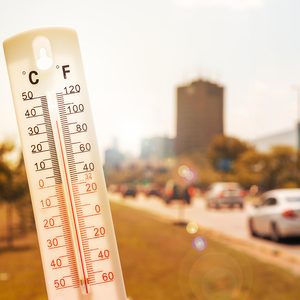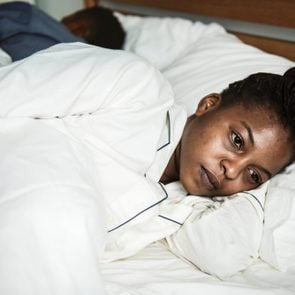How to Sweat Less This Summer
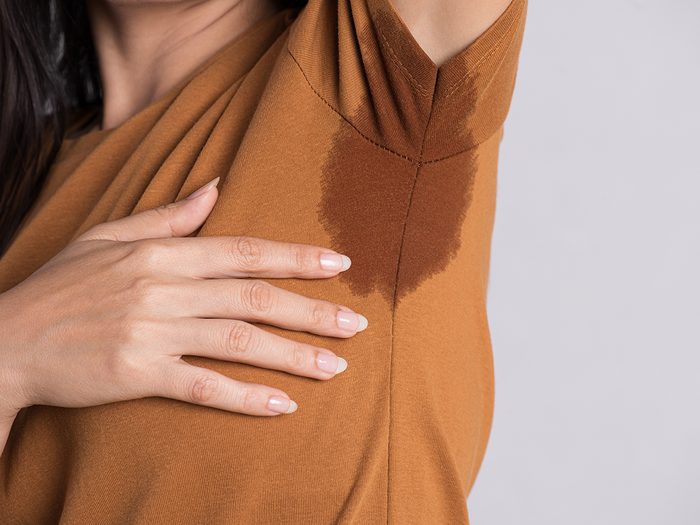
Sweating is good—up to a point. Here's how to control it.
Hello, summer. Cue hot days at the beach, the pool, the park, or a classic backyard barbecue. Another unforgettable and less enjoyable staple of summer? More sweat.
You may feel like those sweat-drenched shirts and sweat stains are an embarrassment, but sweating actually serves a purpose.
“The primary reason we sweat is thermoregulation, the control of body temperature,” explains Brian Ginsberg, MD, board-certified dermatologist at Chelsea Skin & Laser, and clinical assistant professor of dermatology at Mount Sinai Hospital in New York City. “When we get too hot, sweating helps to cool the body down.” While sweating also helps to hydrate the skin and maintain our fluid-electrolyte balance, the end result can be uncomfortable.
According to Shahinaz Soliman, MD, family practice physician, owner of Soliman Care Family Practice Center in Torrance, California, the human body has two- to four-million sweat glands in the underarms, feet, palms, groin, and forehead. “When you sweat and it evaporates, it takes the heat with it.”
Follow these simple fixes to sweat less in summer and keep your cool.
Apply antiperspirant at night
Deodorant and antiperspirant might be thought of as interchangeable, but they each have distinct uses. “Deodorants alone are merely fragrance, whereas antiperspirants serve to reduce sweating,” explains Dr. Ginsberg, adding, “Specifically, antiperspirants contain an ingredient that forms a plug in the sweat glands. Prescription-strength antiperspirants do this more effectively.”
Nikhil Dhingra, MD, board-certified dermatologist at Spring Street Dermatology in New York City agrees: “It’s inexpensive and highly effective at decreasing the odour-causing apocrine sweat. This does require the use of aluminum in your antiperspirant, which essentially interacts with sweat to create a salt that physically blocks the exit point for sweat, and this can last a number of hours.”
In order to get the most from your antiperspirant, apply to dry skin at night. “Your antiperspirant—with or without deodorant—should be applied at nighttime when your sweat production is lowest so it has the best chance of actually blocking those sweat glands,” explains Dr. Dhingra, who also recommends those with sensitive skin avoid fragrances due to the thinness of underarm skin. “The use of deodorizing fragrance-rich products is generally best avoided as the alcohol-based fragrances are usually the main culprit of itchy irritating reactions from deodorants.”
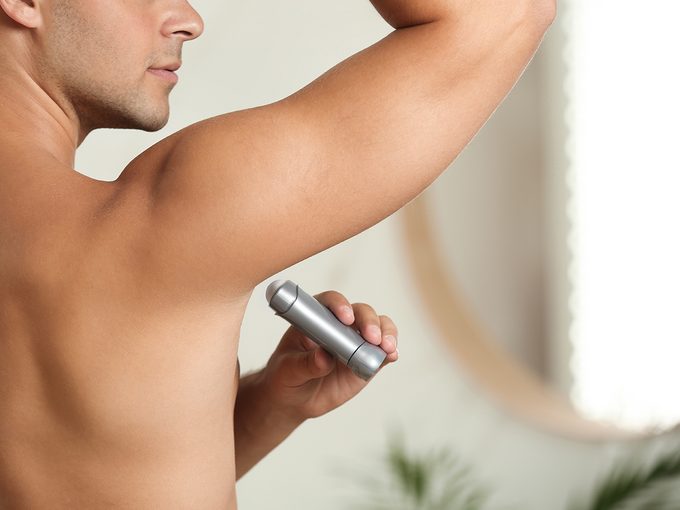
Use a hairdryer after applying deodorant
Especially sweaty? Dr. Ginsberg recommends using a hairdryer after applying deodorant—using the cool setting. He adds: “High-strength antiperspirants should be applied at night time, at first every night, and then spaced out to the needed frequency. A non-medicated deodorant can be added in the morning if desired.”
Avoid food and drinks that make you sweat
While a frosty beer or chilled glass of Rosé might seem like a perfect drink for a hot summer day, neither is the best choice for people prone to sweating. “Alcohol is a common trigger of heavy sweating,” explains Dr. Dhingra, advising the avoidance of both alcohol and caffeine, which can also stimulate sweating, and recommending drinks with electrolytes, instead.
Spicy foods are another category to avoid. “Alcohol, caffeine, and spicy foods are the trinity of sweat-inducing foods to minimize if you sweat heavily,” says Dr. Dhingra. “Alcohol and caffeine stimulate adrenaline production which will quite quickly amplify your sweat production; this is definitely most pronounced for those diagnosed with hyperhidrosis,” otherwise known as excessive sweating.
Dr. Ginsberg doesn’t worry as much about food—with certain exceptions. “Diet does not tend to have a significant impact on sweating, except in the case of gustatory sweating: The small drops of sweat on the forehead, nose, and lip after eating hot, spicy food,” explains Dr. Ginsberg.
Get a prescription to treat hyperhidrosis
If over-the-counter (OTC) methods aren’t working to help get rid of sweat, you might consider visiting your doctor. “You may have hyperhidrosis, which is sweating in excess of what is deemed an average normal amount,” says Dr. Dhingra.
“A misconception regarding this diagnosis is that people with hyperhidrosis have perennial excessive sweating,” explains Dr. Dhingra. “This excessive perspiration can definitely be exacerbated or intolerable in summer months compared to the cooler months where OTC products are sufficient,” he says. In other words, just because you’re sweating excessively in the summer doesn’t necessarily mean it’s a year-round problem, even if you occasionally do require medical intervention.
Of course, it could be another medical condition—such as pregnancy, menopause, an infection, or even heart disease or certain cancers—causing the excess sweat, too, adds Dr. Soliman, making a doctor visit a good bet for safety’s sake.
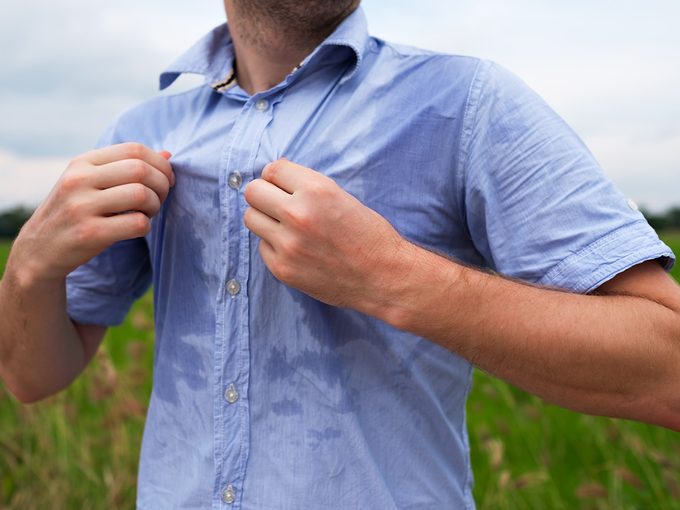
Oral medications to reduce sweat
Options run the gamut, from topical wipes to prescription topicals to pills to help reduce sweat. “Oral medications (glycopyrrolate and oxybutynin) can be prescribed to reduce sweating, especially when excessive,” says Dr. Ginsberg. While the remedies are usually effective, it’s possible they might come with side effects, including dry mouth, dry eyes, and headache, says Dr. Ginsberg.
New medications for sweat control
New remedies also show promise. “There is also a relatively new topical called Qbrexza which delivers medication that blocks the stimulation of sweat glands by acetylcholine, the neurotransmitter that Botox prevents the release of,” explains Dan Belkin, MD, board-certified dermatologist at Laser & Skin Surgery Center of New York and clinical assistant professor, Ronald O. Perelman Department of Dermatology at NYU Grossman School of Medicine, in New York City. And, as a last resort, surgeries to remove underarm sweat glands also exist to treat hyperhidrosis, adds Dr. Soliman.
Wear breathable clothing to avoid overheating
While it might seem obvious, one of the easiest ways to keep from sweating in the summer is by staying cool in the first place. “Since sweat is triggered by heat, the easiest way to avoid sweating is to avoid overheating,” explains Dr. Ginsberg. “This includes wearing light-weight and breathable clothing, finding shaded or air-conditioned environments, and not over-exerting yourself.” Look for fabrics that promote airflow, such as cotton, linen, or blends, and avoid fabrics such as nylon, polyester, or denim. (Swap your denim pieces for chambray, instead.)
“Sleeveless clothing like dresses, if you’re comfortable doing so, will keep you much cooler than occlusive, warm clothing,” says Dr. Dhingra, adding, “Also allow the feet to breathe; cooler feet can decrease your overall body temperature efficiently, so avoid thick socks and bulky shoes during the warm months.”
Next, check out 20 tricks to keep your house cool without AC.
